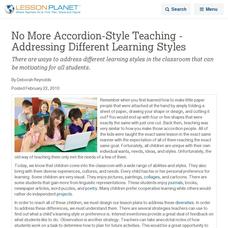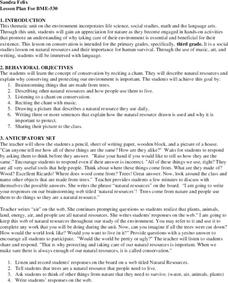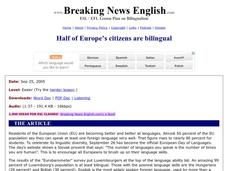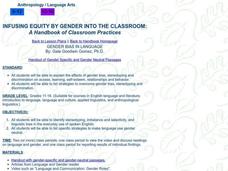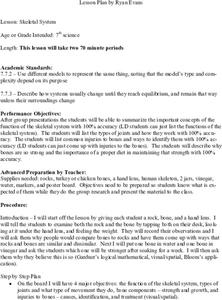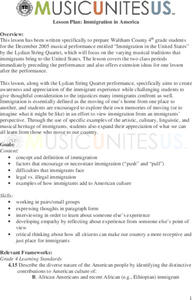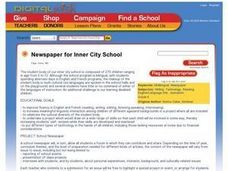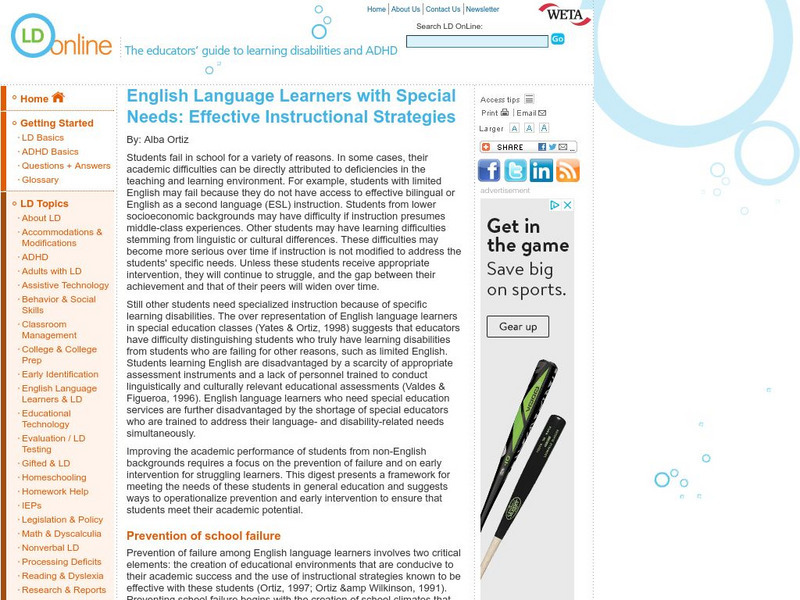Curated OER
Debating for Land
Students discover about the varying attitudes and definitions of land ownership held by Native and European Americans. They study a variety of primary documents from the nineteenth century.
Curated OER
Mother Language Day
In this Mother Language Day worksheet, students complete activities such as reading a passage, matching phrases, fill in the blanks, choose the correct word, multiple choice, unscramble the words, sequencing, unscramble the sentences,...
Curated OER
No More Accordion-Style Teaching - Addressing Different Learning Styles
There are ways to address different learning styles in the classroom that can be motivating for all students.
Curated OER
Conservation
Third graders examine the concept of conservation by brainstorming things that are made from trees and then describe other natural resources and how people use them to live. They listen to a chant on conservation and recite it to music.
Curated OER
Breaking News English: Half of Europe's Citizens are Bilingual
In this English activity, learners read "Half of Europe's Citizens are Bilingual," and then respond to 47 fill in the blank, 7 short answer, 20 matching, and 8 true or false questions about the selection.
Curated OER
Skeletal System
Seventh graders explore the functions of the skeletal system. They collaborate in small groups to determine the function of the skeletal system, the types of joints and movement, bone strength and growth, and bone injuries including...
Curated OER
Gender Bias in Language
Twelfth graders study the issues between male and females. In this current events lesson, 12th graders read an article and answer questions. Students watch a video and write an essay.
National Endowment for the Humanities
Chinua Achebe's Things Fall Apart: Oral and Literary Strategies
Readers are first introduced to Chinua Achebe's Things Fall Apart by making a map of Africa. They will better understand the novel's historical and literary contexts, European and African literary traditions, and how historical events...
Curated OER
Iconoclasm as it pertains to the Reformation
Ninth graders examine the Protestant reformation. In this World History lesson, 9th graders analyze various photographs from the Reformation. Students watch a video clip of Luther's trip to Rome.
Curated OER
Immigration in America
Fourth graders examine the musical traditions that immigrants bring to the United States. They discuss the concept of home, complete the "My Home" worksheet, participate in a class discussion, and write a letter to a fourth grade...
Curated OER
European Union
Students read a short dialogue that takes place between a Canadian who is touring France and a French citizen. In this World History lesson, students create answers to comprehension questions. Students participate in a class discussion.
Curated OER
Social Studies: Ramadan Observance
Students discuss Ramadan and the practice of fasting. Working in groups, they visit Websites and complete worksheets about the Muslim holiday. Students write letters role-playing as someone unfamiliar with a celebration and then write...
Curated OER
Local Customs of Southeast Asian Countries
Students examine the cultural nuances of insular countries in southeast Asia. They perform skits demonstrating local customs of the countries examined, including greetings, visiting, business, drinking, and gift giving.
Curated OER
Cocina Mexicana
Students research authentic Mexican food recipes on the Internet and translate them into English noting any new vocabulary. They present their recipes and vocabulary to the class.
Curated OER
Whose Rock Is This Anyway?
Learners will seek to understand the events at Pipestone Quarry and what may have caused them. Pipestone Quarry in Pipestone, Minnesota, bears the mythic red Sioux quartzite called Pipestone or Catlinite.
Curated OER
Newspaper for Inner City School
Young scholars use their writing skills and digital cameras to produce a newspaper. They write about school events, class projects, items of interest, culturally-related issues, and interview students. Young scholars edit digital images...
Countries and Their Cultures
Countries and Their Cultures: Tropical Forest Foragers
The term "tropical-forest foragers," or "pygmies," refers to ethno-linguistically diverse peoples distributed across the forested regions of Central Africa who are particularly short in stature and who traditionally have lived by...
American Institutes for Research
Center on Response to Intervention: Culturally Responsive Rti
This series of professional learning modules, released by the National Center for Culturally Responsive Educational Systems (NCCRESt), presents Response to Intervention (RTI) as a culturally responsive framework for ensuring...
Lumen Learning
Lumen: Multimodality: The Five Modes of Communication
This lesson focuses on the five modes of communication: visual, linguistic, spatial, aural, and gestural along with examples of each.
LD Online
Ld Online: English Language Learners With Special Needs
This site provides a synopsis of educating ELL students who are struggling in school, and identifying learning disabilities in this population of students. Included are strategies for avoiding misidentification and implementing early...
Discovery Education
Discovery Education: Rome's Influence
A lesson plan which has students understanding the impact that Rome had on history, from things as diverse as city planning to our everyday vocabulary.
University of Washington
University of Washington Libraries: South Asian Oral History Project
hese interviews reflect religious, linguistic, occupational and gender diversity and provide rich insight into changing experiences of South Asians in the Pacific Northwest.
Rock and Roll Hall of Fame
Rock & Roll Hall of Fame: Sti Lesson 17: Irony Made Understandable
One of the more difficult literary concepts to teach is irony, especially ironic point of view. Not only do students often miss the subtle linguistic clues, they become distracted by the issue of author's intent. Whether it's the classic...




